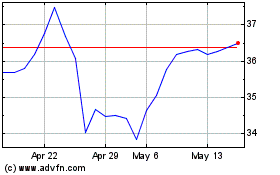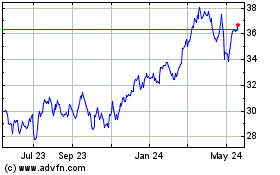Deutsche Bank AG is investigating a series of trades that may
have improperly generated millions of dollars in personal profits,
some at the bank's expense, for a handful of current and former
employees, according to people familiar with the matter.
Among those who internal auditors believe profited from the
trades is Colin Fan, these people said. Mr. Fan was co-head of
Deutsche Bank's investment bank when he left as part of a shake-up
in October. The auditors estimate Mr. Fan has made $9 million on a
roughly $1 million investment.
The trades, which started in 2009, were meant to remove some of
the risk that Deutsche Bank had taken when it made a deal with a
large insurance-company client, the people said. Some of the trades
continue.
Led by Mr. Fan's team, Deutsche Bank found a hedge fund to take
over the bulk of the risk-offloading part of the deal, according to
the people. But the fund didn't put up all the cash: Mr. Fan and
five other Deutsche Bank employees chipped in some of their own
money.
Internal bank auditors are examining whether Mr. Fan and other
employees set up the structure to make Deutsche Bank pay an
inflated share of profits and fees to themselves and the hedge
fund, while locking the bank into high fixed costs, the people
said. The internal auditors are also probing whether the compliance
review of the structure was adequate, they said.
"We are reviewing a transaction that may have involved
unacceptable conflicts of interest when structured in 2009," a
Deutsche Bank spokesman said. Following its internal investigation,
he said, the bank "will take disciplinary measures where
appropriate and review further our controls to minimize the chance
of a reoccurrence."
Executives don't believe any clients involved were disadvantaged
by the transaction, the spokesman said. The bank has suspended
bonuses or other pay to the individuals involved.
A spokesman for Mr. Fan said he had "fulfilled all appropriate
compliance procedures, been entirely transparent at all times, and
denied any wrongdoing."
The probe hasn't been previously reported. Details of the trades
also have been referred to European and U.S. regulators, people
familiar with the matter said. The probe's final results are
expected to be delivered to senior management in coming weeks.
A person briefed on the continuing internal investigation said
auditors haven't determined whether the bank lost money overall, in
part because the trades begot other trades that generated
commissions and fees.
On its own—without accounting for the ancillary revenue—the 2009
arrangement might have cost Deutsche Bank more than $60 million,
according to a preliminary auditors' assessment, the person
said.
Mr. Fan left Deutsche Bank in a management overhaul under new
Chief Executive Officer John Cryan. Mr. Fan's role in the
transaction factored into Mr. Cryan's decision to appoint a
different executive to take over his role, according to people
close to the matter.
Mr. Fan, who in 2009 was global head of credit trading, was the
most senior of the six then-employees to invest in the trades under
review and was the one who profited the most, the people said.
The 43-year-old credit trader joined Deutsche Bank in 1998 and
later rose under former co-CEO Anshu Jain, who promoted him in 2012
to oversee all of global securities trading. Mr. Jain left the bank
last year.
Altogether, internal auditors estimate that the six current and
former Deutsche Bank employees have made about $37 million on the
trades, which will close off next year, according to the person
briefed on the audit. The individuals invested about $4.5 million
combined, alongside a small hedge fund based in Monaco, Greengate
SAM, that has made roughly $80 million, at a roughly equal rate of
return, the people said.
Greengate didn't respond to requests to comment.
In years past, employees at Deutsche Bank and other lenders had
more leeway to invest in trades controlled by their employees or
alongside bank clients, compliance specialists and bank executives
said. Those rules have been tightened apace with other restrictions
on behavior.
But banks have long policed their own employees' personal
trading and required disclosure to avoid conflict. Such rules
widely require that employees detail any personal investments that
run counter to clients' or shareholders' interests.
The 2009 trade originated in a roughly $750 million deal between
French insurer AXA SA and Deutsche Bank, through which the bank
would arrange derivatives trades in part using AXA's money,
according to people familiar with the transaction.
Deutsche Bank sought to profit through a strategy known as index
arbitrage—essentially betting on the pricing differences between
credit indexes and the companies that make them up, which will
ultimately come together. But it didn't want the price swings on
its own books, the people said.
Mr. Fan's team and Deutsche Bank salespeople signed up Greengate
to manage the derivative-trading portfolio and to take on the risk
of those swings, the people said. Another former Deutsche Bank
deal-structuring specialist who worked on the arrangement also
invested, one of the people said.
Another participant was Antoine Cornut, who worked for Mr. Fan
at the time, the people said. Mr. Cornut left the bank in 2012. He
didn't respond to requests to comment.
John Pipilis, currently Deutsche Bank's co-head of global credit
trading, and André Muschallik, a senior salesman, also invested,
the people said. Messrs. Pipilis and Muschallik declined to comment
through a bank spokesman.
The index-arbitrage trades were viewed as "free money" for
investors who could stomach the price swings and wait out the
trades.
To amplify what would have been a thin profit margin, Deutsche
Bank lent the investors roughly $30 for every $1 invested, the
people said. The trades generated steady returns.
A senior bank official who in 2009 was operations chief of the
trading unit, Henry Ritchotte, approved the general structure of
the transaction but with certain conditions, including that the
bank would market the offering to clients and that the bank would
earn its fair share of the profits, according to a person familiar
with the matter.
Mr. Ritchotte declined to comment through a bank spokesman.
It is unclear how extensively Deutsche Bank tried to market the
deal. One person briefed on the internal audit said other employees
were told that the offering was oversubscribed. Another person
close to the matter said the investment was too small and
complicated for big clients, and other hedge funds didn't want to
take part in a deal in which they wouldn't be in control of
investment strategy.
Other senior executives became aware of the situation in 2014,
when employees raised issues with auditors about Mr. Fan's and his
colleagues' positions, the people said.
Write to Jenny Strasburg at jenny.strasburg@wsj.com
(END) Dow Jones Newswires
May 19, 2016 16:45 ET (20:45 GMT)
Copyright (c) 2016 Dow Jones & Company, Inc.
AXA (QX) (USOTC:AXAHY)
Historical Stock Chart
From Jun 2024 to Jul 2024

AXA (QX) (USOTC:AXAHY)
Historical Stock Chart
From Jul 2023 to Jul 2024
